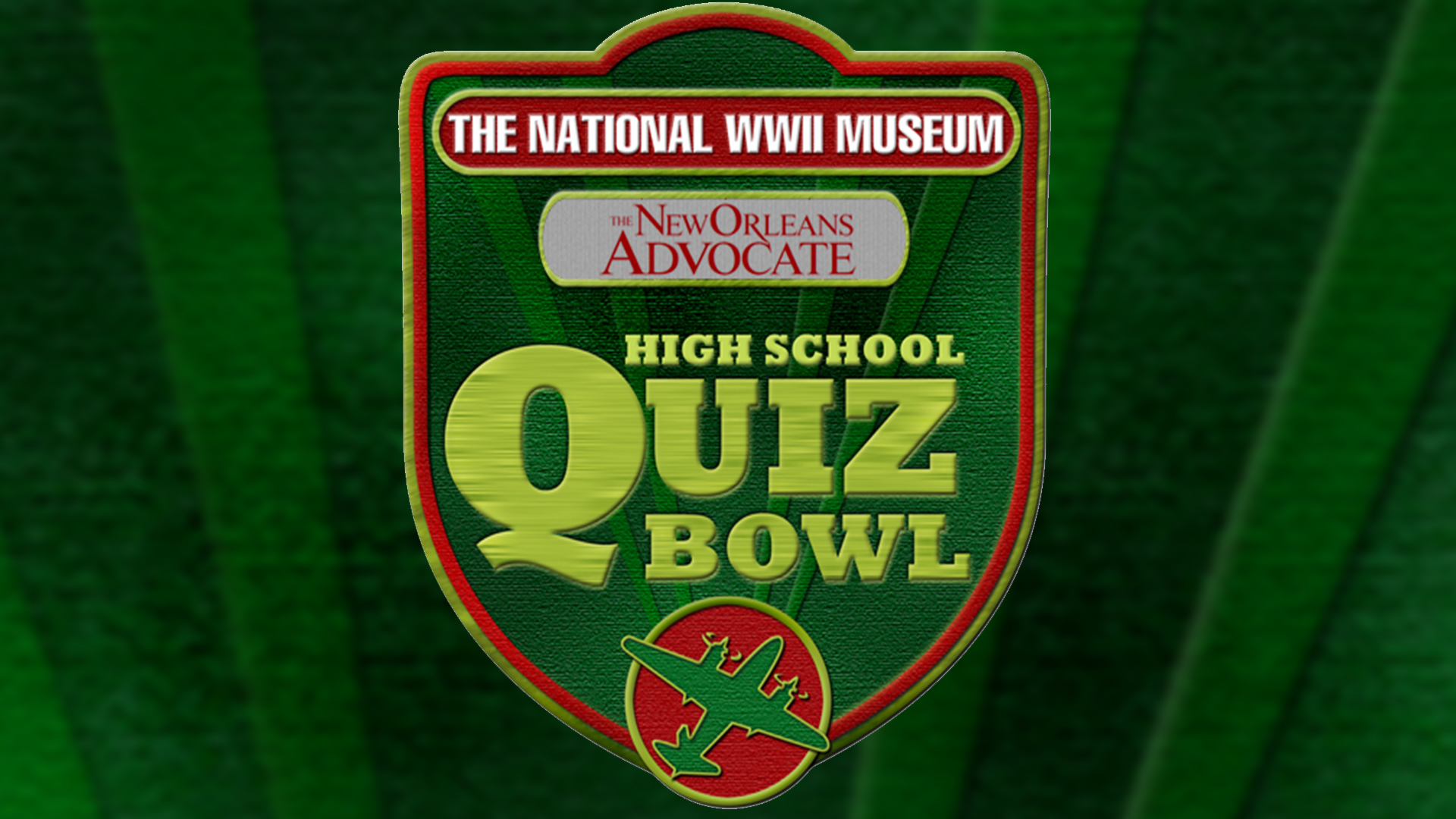Gone are the days of sitting around a table pondering the answer to a question posed by one of the group. Poof! Just like that, a person has solved the trivia puzzle boggling their brain, courtesy of their favorite pocket-sized Internet search agent advertised as a necessity.
Encouraging Teamwork through Competition
“Most of all, it’s fun!” Kenneth Hoffman said. “Knowing any specific WWII fact probably won’t enhance a student’s life, but engaging in the learning and sharing of any historical topic adds fullness to a student’s life experience.”
Hoffman is the Director of Education at the National World War II Museum. This March, Hoffman was the host/moderator of the 13th Annual WWII High School Quiz Bowl. The finals had local returning Quiz Bowl champion Jesuit High School facing off against a talented St. Thomas High School from Texas.
Both schools impressed at the preliminary round on March 11 where 23 high schools were challenged to prove their understanding of the past.
Ultimately it was St. Thomas taking the Quiz Bowl crown, but not without Jesuit putting up a great fight.
The teams are composed of three high school students, and Hoffman suggests that the most successful crews are a well-rounded bunch. “The best teams generally have students who have different interests in WWII history,” Hoffman wrote.
One teammate is fascinated by battles, the other is mindfully drawn to political figures and another specializes in geography, the group might have a chance to cover all of their bases and be ready for any question that comes up. “I do ask about lots of topics,” Hoffman said. “The WWII music questions often trip students up.”
When considering how learning the past impacts understandings of today, Hoffman noted that it’s common for students and teachers to reference George Santayana’s quote, “People who don’t learn from history are doomed to repeat it.”
While it’s certainly thought-provoking, Hoffman thinks it might paint a dark picture of the past, noting there are also positive lessons from history that can provide equally meaningful inspiration for today’s youth.
“The ‘We’re all in this together’ ethos that permeated much of the country during WWII is an example of a positive message from the past that can prepare students for today’s world,” Hoffman said.
It’s fitting that the Quiz Bowl teams have the same mentality when tackling questions that probe their knowledge of the time period.
Learning to be Responsible Historians
Whether they know it or not, young minds are creating history now in an age filled with ever-changing innovation. It’s hard for some adults to even imagine a time when cell phones weren’t the go-to communicative device utilized nearly every second of the day.
Studying the past and understanding how the present world came to be is a grounding practice that keeps high school students connected to their predecessors. It’s common reflection to see that staying so virtually connected has somewhat dissuaded humanity from living in the moment and connecting face to face. The opportunity to read a person’s disposition through eye contact and body language is lost in cyberspace.
Just as there is much left to interpretation when communicating via text and email, history can also be misconstrued if not documented responsibly. Studying history encourages students to do their homework in fact checking and asking the right questions before hopping to conclusions.
Hoffman suggests, “Who wrote or created this history? Why was it written? What sources were used? What was left out and why? Are there other sources I should look at to get other facts and opinions?”
These same questions can help personal communication from being misunderstood, especially when that communication comes in the form of an emoji or text message.
Shaping the Future by Studying the Past
By encouraging students to observe and appreciate history, teachers can help adolescents build the intellectual and social skills needed to succeed in a fast-paced, highly competitive world, ensuring they maintain the qualities that make humans human.
Hoffman believes there are many uses for studying and creating history.
“It teaches skills, like critical thinking, analysis of sources, clear writing, and persuasive argumentation,” he said, adding that all of those qualities are necessary to achieving success in many professions.
Teachers of today are faced with new challenges of creating unique lesson plans that jump from the pages of textbooks. Teachers must pull students into the discussion and away from the countless distractions around them. Students of today crave lessons packaged with pizzazz and glittered with information presented in speeds that put music videos to shame.
By crafting a fun and supportive environment fueled by friendly competition and rewarded with life-long lessons, the WWII museum has embraced a traditional yet creative approach to inspiring future leaders to learn and grow from history. All Quiz Bowl team members and team teachers receive a year-long museum membership, a healthy gift providing hungry minds the food to learn every aspect of WWII history at their leisure.
Registration for the 2018 WWII Quiz Bowl will begin in early January.








Technology has provided a comprehensive cheat sheet for momentary intelligence, and that’s a powerful tool – but with no thought process required, has it taken away the practice of learning? With practice, comes comprehension and application. Without practice, is the retention really there?